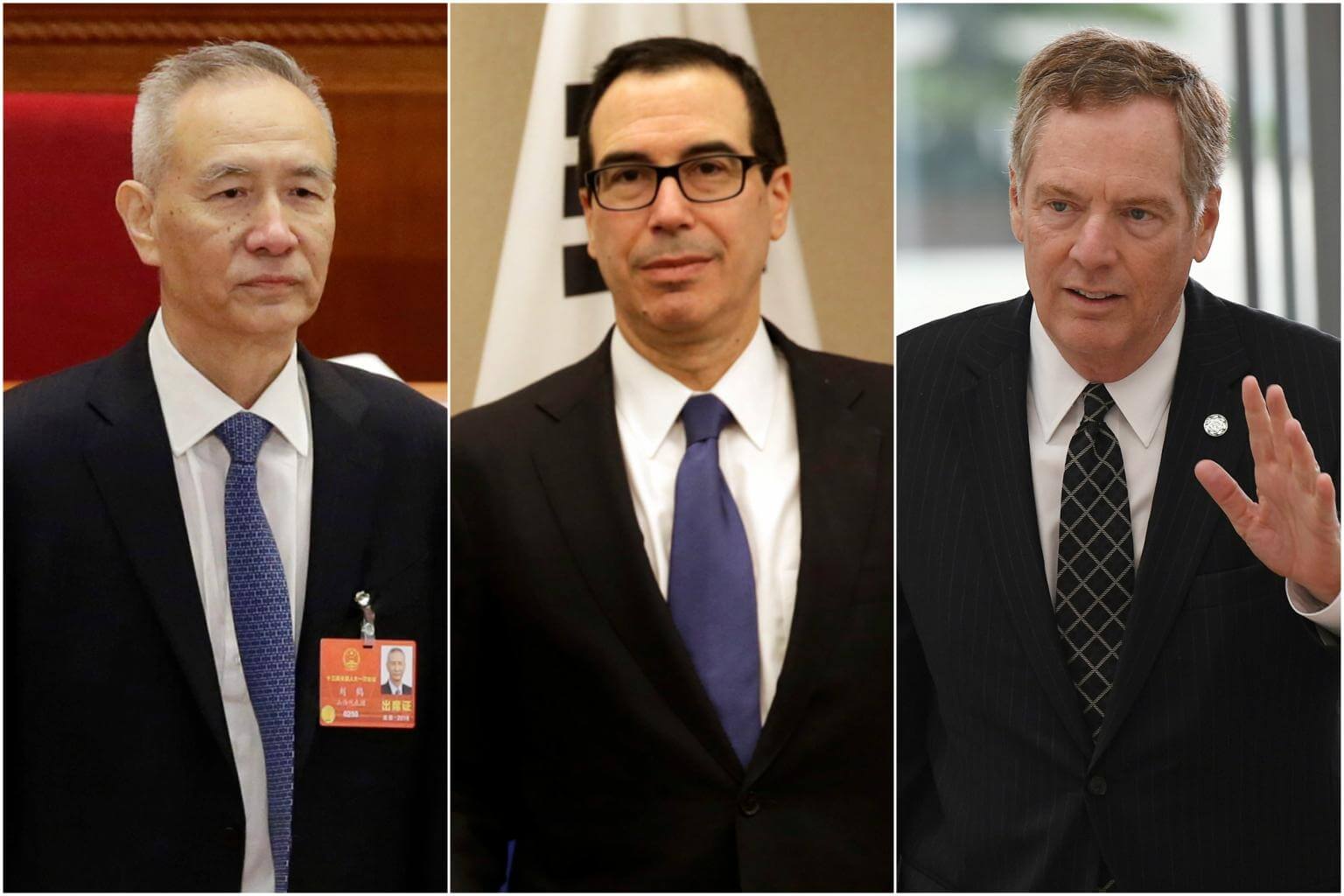China and US begin behind-the-scenes negotiations amid trade tensions: Report
Sign up now: Get ST's newsletters delivered to your inbox

The discussions – led by (from left to right) China’s economic czar Liu He, US Treasury Secretary Steve Mnuchin and US trade representative Robert Lighthizer – cover topics including manufacturing and financial services.
PHOTOS: REUTERS
Follow topic:
NEW YORK (REUTERS, AFP) - China and the United States have begun behind-the-scenes negotiations to improve American access to the Chinese domestic market, the Wall Street Journal (WSJ) said on Sunday (March 25).
News of the talks follow days rife with tension, raising the spectre of a trade war between the world's top economies following US President Donald Trump's announcement last Thursday (March 22) of plans for tariffs on up to US$60 billion (S$78.79 billion) of Chinese goods..
Firing a retaliatory warning shot in response to separate US tariffs on steel and aluminium, China declared plans to levy additional duties on up to US$3 billion of US imports.
WSJ said the discussions - led by China's economic czar Liu He, US Treasury Secretary Steve Mnuchin and US trade representative Robert Lighthizer - cover topics including manufacturing and financial services, citing anonymous sources close to the issue.
The US administration last week sent a letter to Mr Liu seeking a tariff cut on US autos to help cut China's trade surplus with the United States, WSJ said, quoting sources with knowledge of the matter.
In the letter, Mr Mnuchin and Mr Lighthizer said China should also buy more US semiconductors and give US firms greater access to the Chinese financial sector, the Journal said, quoting sources with knowledge of the matter.
The WSJ said Mr Mnuchin is also considering a Beijing trip to continue the talks.
Speaking on Fox News on Sunday, Mr Mnuchin said "we're working on a pathway to see if we can reach an agreement as to what fair trade is for them." "I am cautiously hopeful we reach an agreement, but if not we are proceeding with these tariffs."
He also said President Trump had no intention of backing down and was not worried about a trade war.
"We are going to proceed with our tariffs. We're working on that," Mr Mnuchin told Fox News. "So, as President Trump said, we're not afraid of a trade war, but that's not our objective."
The deepening rift has sent a chill through financial markets and the corporate world as investors predicted dire consequences for the global economy should trade barriers start going up.
Mr Liu, one of China's newly appointed vice-premiers, told Mr Mnuchin in a telephone call on Saturday that the US has flouted trade rules with its inquiry into intellectual property, and that China will defend its interests.
US officials say an eight-month probe under the 1974 US Trade Act has found that China engages in unfair trade practices by forcing American investors to turn over key technologies to Chinese firms.
The Financial Times reported that Chinese government officials are confident that a carefully calibrated response to the tariffs planned by Mr Trump will contain the fallout of the trade dispute.
The government will focus instead on longer-term strategic goals outlined by Chinese President Xi Jinping in October, when he called for the country to become one of the world's strongest and most prosperous nations by 2050.
Chinese officials, in private conversations, have said they will respond to the US sanctions in kind, but hope to avoid escalating the situation.
"Xi and China as a whole have a bigger agenda than trade in dealing with the US. It is a small potato," one senior Chinese government adviser told The Financial Times. "It is not in China's interest to launch a massive trade war."
"Xi and China as a whole have a bigger agenda than trade in dealing with the US. It is a small potato," one senior Chinese government adviser told The Financial Times. "It is not in China's interest to launch a massive trade war."
The adviser said Beijing is confident of reducing its US$375 billion surplus with the US and announcing new market-opening measures within six months, which would allow Mr Trump to claim victory before November's mid-term congressional elections in America.
"When two parties negotiate you have to bluff, and Trump is a businessman," the adviser said.
The Trump administration has argued that the proposed tariffs are a justified response to the alleged theft of US intellectual property by forcing American companies to form joint ventures to do business in the country and transfer technology.
US officials have also been frustrated with the lack of results from a "100-day" trade negotiation with China that was launched just after Mr Trump met Mr Xi for the first time a year ago.
The Chinese government had subsequently announced it would open the domestic market to US beef producers and electronic payment firms.
"The ball has always been in China's court. We have been having conversations for way too long. Negotiations need to be based on actually doing something, not just talking all the time," said a senior US official at a briefing in Beijing on Friday.
Even if Mr Trump follows through on his threat of tariffs worth US$60 billion at rates as high as 25 per cent, Chinese officials are confident that the impact will be small, given that the exports targeted by the Trump administration in its latest action represent less than three per cent of China's total exports, reported The Financial Times.

